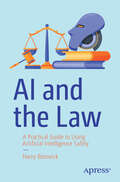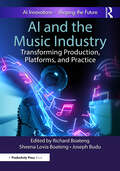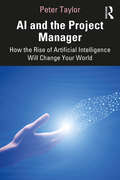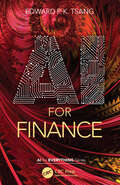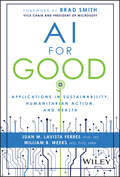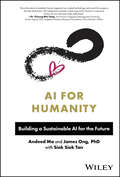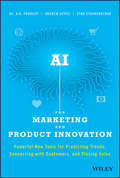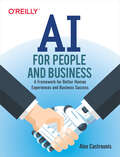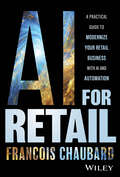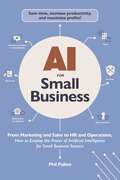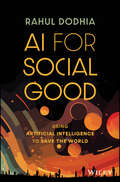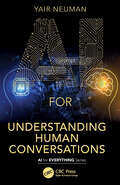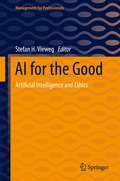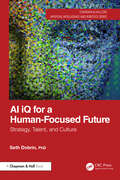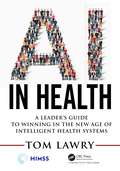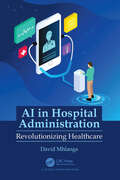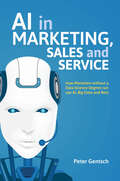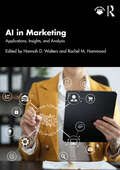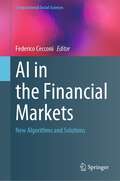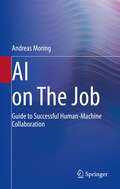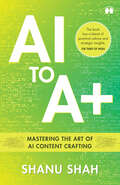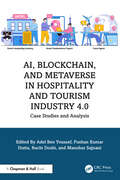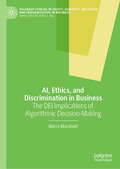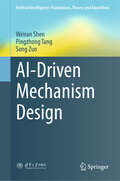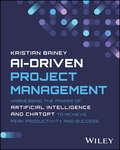- Table View
- List View
AI and the Law: A Practical Guide to Using Artificial Intelligence Safely
by Harry BorovickLearn how to maximize your use of, and benefit from AI, personally and professionally while staying safe. To satisfy professionals and businesses trying to modernize their approaches to work and personal tasks, this book will explain some of the basics of what AI is, what AI is likely to look like in the near future, and how not to get stung using it. You’ll quickly realize that AI isn’t coming, it’s here, along with its opportunities and challenges. While some of the advantages of using AI tools may seem too good to be true, you’ll discover that the key to navigating the early stages of the AI era is to understand its guiding principles and then to prioritize the guidelines. The book features general situations and use cases to help you experience AI for fun and for work while retaining the benefits, profits, creations, outputs, and efficiencies of it. If you’re going to use AI in your daily career, whether as a student, creative, executive, marketer or in sales this book will help you understand how to bypass obstacles and get value from AI with the guidance of an AI and tech lawyer. What You Will Learn Identify, debunk, and protect against business and legal risk in the AI eraDiscuss these issues on a high level with CTOs and COOsSee how professionals can mutually use AI to their benefit Who This Book is For Anyone who wants to know whether AI is really going to change the world through the lens of their industry, or to simply understand how AI can be safely harnessed to maximize daily value while minimizing practical risks.
AI and the Music Industry: Transforming Production, Platforms, and Practice
by Richard Boateng Sheena Lovia Boateng Joseph BuduIn recent years, the profound impact of artificial intelligence (AI) on fostering new forms of entrepreneurship has become increasingly evident. Entrepreneurs worldwide are harnessing the capabilities of AI to develop innovative solutions and create businesses that address pressing challenges.Despite the growing recognition of AI’s potential, there exists a crucial need to deepen understanding and awareness surrounding how individuals are leveraging AI to establish novel ventures. Many entrepreneurs are pioneering initiatives that deploy AI technologies to tackle complex problems. This challenge revolves around the imperative to explore, document, and comprehend the diverse ways in which AI is driving the emergence of new businesses, solving real-world problems, and reshaping the entrepreneurial landscape. It underscores the necessity for entrepreneurs, researchers, and the wider community to grasp the transformative role of AI in fostering innovation and enabling the creation of businesses dedicated to addressing societal issues. Addressing this challenge will contribute to a more comprehensive understanding of the synergy between AI and entrepreneurship, paving the way for informed and impactful ventures that leverage the full potential of AI technologies.This book delves into the transformative impacts of AI on the music industry. It reviews trends in digital platforms and music research, the integration of AI in music production, and the experiences of artists and music publishers using AI. It presents a comparative analysis of AI adoption patterns in the music industry and provides practical insights into the use of AI tools for music production and distribution. Additionally, it offers a detailed syllabus for training music industry stakeholders on harnessing AI technologies, illustrating the significant role AI plays in shaping the future of music.
AI and the Project Manager: How the Rise of Artificial Intelligence Will Change Your World
by Peter TaylorEnabling project managers to adapt to the new technology of artificial intelligence, this first comprehensive book on the topic discusses how AI will reinvent the project world and allow project managers to focus on people. Studies show that by 2030, 80 percent of project management tasks, such as data collection, reporting, and predictive analysis, will be carried out by AI in a consistent and efficient manner. This book sets out to explore what this will mean for project managers around the world and equips them to embrace this technological advantage for greater project success. Filled with insights and examples from tech providers and project experts, this book is an invaluable resource for PMO leaders, change executives, project managers, programme managers, and portfolio managers. Anyone who is part of the global community of change and project leadership needs to accept and understand the fast- approaching AI technology, and this book shows how to use it to their advantage.
AI for Finance (AI for Everything)
by Edward P. TsangFinance students and practitioners may ask: can machines learn everything? Could AI help me? Computing students or practitioners may ask: which of my skills could contribute to finance? Where in finance should I pay attention? This book aims to answer these questions. No prior knowledge is expected in AI or finance. To finance students and practitioners, this book will explain the promise of AI, as well as its limitations. It will cover knowledge representation, modelling, simulation and machine learning, explaining the principles of how they work. To computing students and practitioners, this book will introduce the financial applications in which AI has made an impact. This includes algorithmic trading, forecasting, risk analysis portfolio optimization and other less well-known areas in finance. This book trades depth for readability. It aims to help readers to decide whether to invest more time into the subject. This book contains original research. For example, it explains the impact of ignoring computation in classical economics. It explains the relationship between computing and finance and points out potential misunderstandings between economists and computer scientists. The book also introduces Directional Change and explains how this can be used.
AI for Good: Applications in Sustainability, Humanitarian Action, and Health
by Juan M. Lavista Ferres William B. WeeksDiscover how AI leaders and researchers are using AI to transform the world for the better In AI for Good: Applications in Sustainability, Humanitarian Action, and Health, a team of veteran Microsoft AI researchers delivers an insightful and fascinating discussion of how one of the world’s most recognizable software companies is tacking intractable social problems with the power of artificial intelligence (AI). In the book, you’ll learn about how climate change, illness and disease, and challenges to fundamental human rights are all being fought using replicable methods and reusable AI code. The authors also provide: Easy-to-follow, non-technical explanations of what AI is and how it works Examinations of how healthcare is being improved, climate change is being addressed, and humanitarian aid is being facilitated around the world with AI Discussions of the future of AI in the realm of social benefit organizations and efforts An essential guide to impactful social change with artificial intelligence, AI for Good is a must-read resource for technical and non-technical professionals interested in AI’s social potential, as well as policymakers, regulators, NGO professionals, and, and non-profit volunteers.
AI for Humanity: Building a Sustainable AI for the Future
by Andeed Ma James Ong Siok Siok TanCapture the value of cutting-edge AI while mitigating its most salient risks AI For Humanity: Building a Sustainable AI for the Future delivers an incisive and timely discussion of how to design, build, and implement cutting-edge AI in for-profit firms and other organizations in a responsible, sustainable, and ethical way. The book walks you through the three pillars of human-focused AI development—governance, technology, and commercialization—and dives deep into each one, showing you how to create AI products and services that better humanity and advance universally held values. You'll find methodologies and frameworks that mitigate against some of the most profound and unsettling risks of unchecked artificial intelligence development, and roadmaps to help you avoid the numerous pitfalls and traps awaiting unsuspecting companies, managers, and executives. You'll also discover: Real-world case studies, from companies including SAP, Huawei, and Tencent, demonstrating the actual dilemmas and questions firms face when developing and implementing this extraordinary tech Actionable commitments you can make to help ensure you and your company avoid the ethical and reputational risks associated with AI Strategies for AI product and service development consistent with sustainable growth Perfect for managers, executives, directors, and other business leaders with a stake in responsible artificial intelligence design, development, and implementation, AI For Humanity will also interest regulators, academics, thought leaders, and policy makers doing their best to capture AI's substantial potential value while mitigating its most serious risks.
AI for Marketing and Product Innovation: Powerful New Tools for Predicting Trends, Connecting with Customers, and Closing Sales
by A. K. Pradeep Stan Sthanunathan Andrew AppelGet on board the next massive marketing revolution AI for Marketing and Product Innovation offers creatives and marketing professionals a non-tech guide to artificial intelligence (AI) and machine learning (ML)—twin technologies that stand poised to revolutionize the way we sell. The future is here, and we are in the thick of it; AI and ML are already in our lives every day, whether we know it or not. The technology continues to evolve and grow, but the capabilities that make these tools world-changing for marketers are already here—whether we use them or not. This book helps you lean into the curve and take advantage of AI’s unparalleled and rapidly expanding power. More than a simple primer on the technology, this book goes beyond the “what” to show you the “how”: How do we use AI and ML in ways that speak to the human spirit? How to we translate cold technological innovation into creative tools that forge deep human connections? Written by a team of experts at the intersection of neuroscience, technology, and marketing, this book shows you the ins and outs of these groundbreaking technological tools. Understand AI and ML technology in layman’s terms Harness the twin technologies unparalleled power to transform marketing Learn which skills and resources you need to use AI and ML effectively Employ AI and ML in ways that resonate meaningfully with customers Learn practical examples of how to reinvest product innovation, brand building, targeted marketing and media measurement to connect with people and enhance ROI Discover the true impact of AI and ML from real-world examples, and learn the thinking, best practices, and metrics you need to capture this lightning and take the next massive leap in the evolution of customer connection. AI for Marketing and Product Innovation shows you everything you need to know to get on board.
AI for People and Business: A Framework for Better Human Experiences and Business Success
by Alex CastrounisIf you're an executive, manager, or anyone interested in leveraging AI within your organization, this is your guide. You'll understand exactly what AI is, learn how to identify AI opportunities, and develop and execute a successful AI vision and strategy. Alex Castrounis,founder and CEO of Why of AI, Northwestern University Adjunct, advisor, and former IndyCar engineer and data scientist, examines the value of AI and shows you how to develop an AI vision and strategy that benefits both people and business.AI is exciting, powerful, and game changing--but too many AI initiatives end in failure. With this book, you'll explore the risks, considerations, trade-offs, and constraints for pursuing an AI initiative. You'll learn how to create better human experiences and greater business success through winning AI solutions and human-centered products.Use the book's AIPB Framework to conduct end-to-end, goal-driven innovation and value creation with AIDefine a goal-aligned AI vision and strategy for stakeholders, including businesses, customers, and usersLeverage AI successfully by focusing on concepts such as scientific innovation and AI readiness and maturityUnderstand the importance of executive leadership for pursuing AI initiatives"A must read for business executives and managers interested in learning about AI and unlocking its benefits. Alex Castrounis has simplified complex topics so that anyone can begin to leverage AI within their organization." - Dan Park, GM & Director, Uber"Alex Castrounis has been at the forefront of helping organizations understand the promise of AI and leverage its benefits, while avoiding the many pitfalls that can derail success. In this essential book, he shares his expertise with the rest of us." - Dean Wampler, Ph.D., VP, Fast Data Engineering at Lightbend
AI for Retail: A Practical Guide to Modernize Your Retail Business with AI and Automation
by Francois ChaubardThe coming of the AI revolution in brick-and-mortar retail In AI for Retail: A Practical Guide to Modernize Your Retail Business with AI and Automation, Francois Chaubard, AI researcher and retail technology CEO, delivers a practical guide for integrating AI into your brick-and-mortar retail business. In the book, you’ll learn how to make your business more efficient by automating inventory management, supply chain, front-end, merchandising, pricing, loss prevention, e-commerce processes, and more. The author takes you step by step from no AI Strategy at all to implementing a robust AI playbook that will permeate through your entire organization. In this book, you will learn: How AI works, including key terminology and fundamental AI applications in retail How AI can be applied to the major functions of retail with detailed P&L analysis of each application How to implement an AI strategy across your entire business to double or even triple Free Cash Flow AI for Retail is the comprehensive, hands-on blueprint for AI adoption that retail managers, executives, founders, entrepreneurs, board members, and other business leaders have been waiting for.
AI for Small Business: From Marketing and Sales to HR and Operations, How to Employ the Power of Artificial Intelligence for Small Business Success (AI Advantage)
by Phil PallenAn essential guide for small business owners and entrepreneurs looking to use artificial intelligence to automate tasks, improve customer service, make better decisions, grow their businesses faster, and stay ahead of the AI curve.ChatGPT, machine learning, automation, natural language processing. Every day, it seems like there is a new AI term to learn and a new promise of how it will improve your work. But with tons of conflicting information, small business owners are left wondering exactly how to leverage AI technology to grow and, more importantly, stay competitive with larger companies. Cutting through the buzzwords and media frenzy, AI for Small Business is the road map to take you from overwhelmed to empowered. Opening with simple explanations of AI basics and clarification of myths, you are empowered to assess your goals to create a comprehensive AI strategy for your business—including information on selecting tools, a timeline for implementation, and ideas for scaling systems. This essential guide then walks you through practical AI applications for each department, informing you how to use AI to automate tasks, make better decisions, and grow your business in all areas including: -Sales -Marketing -Social media and content creation -Customer service -Finance and accounting -Operations and logistics -Human resources and talent management -Data analysis and decision-making -Security and legal compliance -R&D and innovation Author Phil Pallen is a brand strategist who uses his AI expertise to help hundreds of businesses scale and grow profits. In AI for Small Business, case studies from Pallen&’s successful clients illustrate how real small business owners are applying AI technology in various ways. Plus, ready-to-try prompt sidebars and specific product recommendations allow you to start employing the power of AI in real time.
AI for Social Good: Using Artificial Intelligence to Save the World
by Rahul DodhiaUnderstand the real power of AI and and its ability to shape the future for the better. AI For Social Good: Using Artificial Intelligence to Save the World bridges the gap between the current state of reality and the incredible potential of AI to change the world. From humanitarian and environmental concerns to advances in art and science, every area of life stands poised to make a quantum leap into the future. The problem? Too few of us really understand how AI works and how to integrate it into our policies and projects. In this book, Rahul Dodhia, Deputy Director of Microsoft’s AI for Good Research Lab, offers a nontechnical exploration of artificial intelligence tools—how they’re built, what they can and can’t do, and the raw material that teaches them what they “know.” Readers will also find an inventory of common challenges they might face when integrating AI into their work. You'll also read more on: The potential for AI to solve longstanding issues and improve lives Learn how you can tap into the power of AI, regardless of the size of your organization Gain an understanding of how AI works and how to communicate with AI scientists to create new solutions Understand the real risks of implementing AI and how to avoid potential pitfalls Real-life examples and stories that demonstrate how teams of AI specialists, project managers, and subject matter experts can achieve remarkable products. Written for anyone who is curious about AI, and especially useful for policymakers, project managers, and leaders who work alongside AI, AI For Social Good provides discussions of how AI scientists create artificially intelligent systems, and how AI can be used ethically (or unethically) to transform society. You’ll also find a discussion of how governments can become more flexible, helping regulations keep up with the fast pace of change in technology.
AI for Understanding Human Conversations (AI for Everything)
by Yair NeumanArtificial intelligence (AI) and specifically large language models (LLMs) revolutionize our lives with new technologies appearing at an unprecedented rate. These technologies can potentially change how we understand human conversations, from the dialogues of married couples to diplomatic conversations.This book explains how to use LLMs to analyze human conversations and how better LLMs can be developed by incorporating a deep theoretical understanding.Drawing on case studies from Pulp Fiction to diplomatic meetings, the book provides detailed, approachable, and theoretically grounded explanations of how LLMs can help us understand conversations.
AI for the Good: Artificial Intelligence and Ethics (Management for Professionals)
by Stefan H. ViewegWhile technology advances at a high pace in the age of machine learning, there is a lack of clear intent and framing of acceptable ethical standards. This book brings together the complex topic of "good" technology in a cross-functional way, alternating between theory and practice.The authors address the ever-expanding discussion on Artificial Intelligence (AI) and ethics by providing an orientation. Pragmatic and recent issues are especially taken into account such as the collateral effects of the COVID19 pandemic. An up-to-date overview of digitization - already a very broad field in itself - is presented along with an analysis of the approaches of AI from an ethical perspective. Furthermore, concrete approaches to consider appropriate ethical principles in AI-based solutions are offered. The book will be appealing to academics, from humanities or business or technical disciplines, as well as practitioners who are looking for an introduction to the topic and an orientation with concrete questions and assistance.
AI iQ for a Human-Focused Future: Strategy, Talent, and Culture (Chapman & Hall/CRC Artificial Intelligence and Robotics Series)
by Seth DobrinAI iQ for a Human-Focused Future: Strategy, Talent, and Culture offers a pioneering approach to integrating artificial intelligence (AI) and generative AI (GenAI) in business, emphasizing a business strategy first mindset over a technologycentric one.This book challenges the usual hype surrounding AI, advocating for a more realistic perspective. It delves into the evolution of AI, from traditional data science and machine learning to GenAI, all through the lens of strategic business application. Unlike other texts, this book moves away from case studies, favoring practical, real-world advice from extensive field experience. This book presents strategies for creating an environment that not only accepts but thrives on AI, focusing on strategic leadership, talent development, and inclusivity. It highlights crucial roles, such as the Chief AI Officer, and emphasizes the importance of diversity in AI teams. Uniquely, each chapter concludes with key takeaways, offering actionable steps, and implementation tips. This practical approach transforms theoretical concepts into actionable business strategies, providing leaders with the tools to apply AI initiatives effectively in their organizations.This book is more than an informative resource; it’s a practical toolkit for any business leader aiming to navigate the evolving landscape of AI and GenAI, ensuring their organization is prepared for sustainable growth and success in an AI-driven future.
AI in Health: A Leader’s Guide to Winning in the New Age of Intelligent Health Systems (HIMSS Book Series)
by Tom LawryWe are in the early stages of the next big platform shift in healthcare computing. Fueled by Artificial Intelligence (AI) and the Cloud, this shift is already transforming the way health and medical services are provided. As the industry transitions from static digital repositories to intelligent systems, there will be winners and losers in the race to innovate and automate the provision of services. Critical to success will be the role leaders play in shaping the use of AI to be less "artificial" and more "intelligent" in support of improving processes to deliver care and keep people healthy and productive across all care settings. This book defines key technical, process, people, and ethical issues that need to be understood and addressed in successfully planning and executing an enterprise-wide AI plan. It provides clinical and business leaders with a framework for moving organizations from the aspiration to execution of intelligent systems to improve clinical, operational, and financial performance.
AI in Hospital Administration: Revolutionizing Healthcare
by David MhlangaAI in Hospital Administration: Revolutionizing Healthcare is a groundbreaking book that explores the transformative potential of artificial intelligence (AI) in hospital administration and its impact on revolutionizing healthcare. This book draws on existing academic literature and interdisciplinary research to provide a comprehensive overview of cutting-edge AI technologies and their applications in hospital administration. The book begins by highlighting the basics of AI. It moves to the challenges hospital administrators face, such as long wait times, inefficient scheduling, inaccurate forecasting, and suboptimal resource allocation. It emphasizes the need for effective management and decision-making strategies to optimize patient outcomes while ensuring efficient resource utilization. While AI has seen significant advancements in areas like medical imaging and clinical decision support systems, its role in hospital administration remains relatively understudied. This book aims to fill this gap by delving into the complexities of managing patient flow, optimizing resource allocation, ensuring effective staff scheduling, and implementing data-driven decision-making processes. It explores various AI-powered solutions, including machine learning, natural language processing, and predictive analytics, and their potential to alleviate these challenges. It also covers ethical considerations and potential barriers to AI adoption in healthcare, such as privacy concerns, data security, and the human-machine interface. The book includes real-world case studies and examples of successful AI implementations in hospital administration to provide practical insights. Doing so equips healthcare professionals, administrators, policymakers, and researchers with the knowledge and tools to leverage AI effectively, foster innovation, and drive positive change in healthcare organizations. In short, AI in Hospital Administration: Revolutionizing Healthcare addresses the gap in academic literature surrounding the role of AI in hospital administration. It comprehensively understands this domain's challenges, limitations, and opportunities, stimulating further research and promoting informed decision-making. The book envisions a future where AI plays a central role in transforming healthcare administration for the better.
AI in Marketing, Sales and Service: How Marketers without a Data Science Degree can use AI, Big Data and Bots
by Peter GentschAI and Algorithmics have already optimized and automated production and logistics processes. Now it is time to unleash AI on the administrative, planning and even creative procedures in marketing, sales and management.This book provides an easy-to-understand guide to assessing the value and potential of AI and Algorithmics. It systematically draws together the technologies and methods of AI with clear business scenarios on an entrepreneurial level. With interviews and case studies from those cutting edge businesses and executives who are already leading the way, this book shows you: how customer and market potential can be automatically identified and profiled; how media planning can be intelligently automated and optimized with AI and Big Data; how (chat)bots and digital assistants can make communication between companies and consumers more efficient and smarter; how you can optimize Customer Journeys based on Algorithmics and AI; and how to conduct market research in more efficient and smarter way. A decade from now, all businesses will be AI businesses – Gentsch shows you how to make sure yours makes that transition better than your competitors.
AI in Marketing: Applications, Insights, and Analysis
by Hannah D. Walters Rachel M. HammondAI in Marketing equips students with the knowledge to understand the impact of Artificial Intelligence (AI) on marketing strategies, processes, and activities, empowering them to navigate the AI-driven marketing landscape confidently.Divided into four parts, it provides a comprehensive exploration of AI's transformative role in marketing. The first part lays the groundwork, offering foundational insights into the intersection of AI and marketing. Part II explores the various applications of AI in marketing, and the tools marketers use to optimize their processes and deliver enhanced customer experiences. The third part focuses on leveraging AI for consumer insights, enabling marketers to craft data-driven strategies. The final part examines ethical considerations and the pedagogical integration of AI into marketing education. Each chapter includes real-world examples, exercises, discussion questions, key terms, and AI resources, empowering students to develop practical skills and industry-relevant knowledge.Students studying in advanced undergraduate and postgraduate marketing courses will benefit greatly from this comprehensive textbook, preparing them for a future workplace that requires them to know how to use AI effectively, ethically, and responsibly.The book is fully supported by online resources, including an instructor manual and customizable PowerPoint slides.
AI in the Financial Markets: New Algorithms and Solutions (Computational Social Sciences)
by Federico CecconiThis book is divided into two parts, the first of which describes AI as we know it today, in particular the Fintech-related applications. In turn, the second part explores AI models in financial markets: both regarding applications that are already available (e.g. the blockchain supply chain, learning through big data, understanding natural language, or the valuation of complex bonds) and more futuristic solutions (e.g. models based on artificial agents that interact by buying and selling stocks within simulated worlds).The effects of the COVID-19 pandemic are starting to show their financial effects: more companies in a liquidity crisis; more unstable debt positions; and more loans from international institutions for states and large companies. At the same time, we are witnessing a growth of AI technologies in all fields, from the production of goods and services, to the management of socio-economic infrastructures: in medicine, communications, education, and security. The question then becomes: could we imagine integrating AI technologies into the financial markets, in order to improve their performance? And not just limited to using AI to improve performance in high-frequency trading or in the study of trends. Could we imagine AI technologies that make financial markets safer, more stable, and more comprehensible? The book explores these questions, pursuing an approach closely linked to real-world applications.The book is intended for three main categories of readers: (1) management-level employees of companies operating in the financial markets, banks, insurance operators, portfolio managers, brokers, risk assessors, investment managers, and debt managers; (2) policymakers and regulators for financial markets, from government technicians to politicians; and (3) readers curious about technology, both for professional and private purposes, as well as those involved in innovation and research in the private and public spheres.
AI on The Job: Guide to Successful Human-Machine Collaboration
by Andreas MoringThis book is a practical guide to using artificial intelligence with motivated employees in companies and organizations. You will learn what the prerequisites are for people to look forward to productive collaboration with "intelligent machines". Because this is the only way to leverage the full potential of AI. To this end, you will receive an overview of how and where AI can be used in companies and how to identify the right areas of application for AI in your company. The main issue here is the following: which tasks will be taken over by AI in the future and which should continue to be performed by employees. These decisions change processes and tasks and require practical change management and motivation. In this book, you will learn how to motivate and inspire people for these new tasks, so that the steps towards using AI in the work environment can succeed in the best possible way. About the Author: Prof. Dr. Andreas Moring is Professor of Digital Business, Innovation & AI at the International School of Management. He is founder and director of the JuS.TECH Institute for AI and Sustainability, co-founder of the WeGoFive initiative for productive human-AI cooperation and topic sponsor for human-AI cooperation at the Artificial Intelligence Center ARIC in Hamburg. This book is a translation of the original German 1st edition KI im Job by Andreas Moring, published by Springer-Verlag GmbH Germany, part of Springer Nature in 2021. The translation was done with the help of artificial intelligence (machine translation by the service DeepL.com). A subsequent human revision was done primarily in terms of content, so that the book will read stylistically differently from a conventional translation. Springer Nature works continuously to further the development of tools for the production of books and on the related technologies to support the authors.
AI to A+
by Shanu ShahUnlock the true power of your AI-generated content with AI to A+. Packed with practical strategies and proven techniques, this book equips you with the tools to elevate your writing to new heights. Each chapter presents a carefully crafted rubric designed to transform your drafts into polished, compelling narratives.Whether you are a seasoned content creator or just beginning to explore the world of generative AI, this guide offers actionable insights to make your work stand out. With a handy checklist and key takeaways included, applying these principles becomes a seamless part of your writing routine.More than just a manual, AI to A+ is your strategic partner in mastering the art of AI content editing. So, start your journey towards content excellence today and discover how to make every word count.
AI, Blockchain, and Metaverse in Hospitality and Tourism Industry 4.0: Case Studies and Analysis
by Pushan Kumar Dutta Adel Ben Youssef Ruchi Doshi Manohar SajnaniThe book offers a critical exploration of the integration of AI, blockchain, and metaverse technology in the hospitality and tourism industry to investigate the potential of these technologies in revolutionizing the industry. This comprehensive work studies, with practical examples, how cutting-edge technologies of Industry 4.0 are transforming luxury industry into a high-touch, hyper-personalized metaverse. It explains how these technologies can be used to improve customer experience and operational efficiency in areas such as guest interaction, supply chain management, payment processing, and virtual stores. The book also discusses the conditions that can promote sustainable development in the hospitality industry using Industry 4.0 technologies. Provides an innovative perspective by blending high-tech trends like AI, blockchain, and metaverse with traditional wellness practices Emphasis on ethical considerations and potential risks associated with the use of these technologies, providing a balanced perspective on their impact Includes case studies and practical examples on how businesses can use AI, blockchain, and the metaverse to improve customer experiences and operational efficiency Explores how the hospitality industry can embrace Industry 4.0 technologies to improve its operations, enhance customer experiences, and contribute to sustainable development Provides a roadmap for companies looking to implement these technologies, highlighting potential benefits and pitfalls of each approach This reference book is for scholars and professionals in computer science who are interested in studying the effect of AI, blockchain, and metaverse in hospitality and tourism industry.
AI, Ethics, and Discrimination in Business: The DEI Implications of Algorithmic Decision-Making (Palgrave Studies in Equity, Diversity, Inclusion, and Indigenization in Business)
by Marco MarabelliThis book takes a historical approach to explore data, algorithms, their use in practice through applications of AI in various settings, and all of the surrounding ethical and DEI implications. Summarizing our current knowledge and highlighting gaps, it offers original examples from empirical research in various settings, such as healthcare, social media, and the GIG economy.The author investigates how systems relying on a binary structure (machines) work in systems that are instead analogic (societies). Further, he examines how underrepresented populations, who have been historically penalized by technologies, can play an active role in the design of automated systems, with a specific focus on the US legal and social system.One issue is that main tasks of machines concern classification, which, while efficient for speeding up decision-making processes, are inherently biased. Ultimately, this work advocates for ethical design and responsible implementation and deployment of technology in organizations and society through through government-sponsored social justice, in contrast with free market policies.This interdisciplinary text contributes to the timely and relevant debate on algorithmic fairness, biases, and potential discriminations. It will appeal to researchers in business ethics and information systems while building on theories from anthropology, psychology, sociology, management, marketing, and economics.
AI-Driven Mechanism Design (Artificial Intelligence: Foundations, Theory, and Algorithms)
by Weiran Shen Pingzhong Tang Song ZuoDue to its huge success in industry, mechanism design has been one of the central research topics at the interface of economics and computer science. However, despite decades of effort, there are still numerous challenges, in terms of both theory and applications. These include the problem of how to design mechanisms for selling multiple items, dynamic auctions, and balancing multiple objectives, given the huge design space and buyer strategy space; and the fact that in practice, the most widely applied auction format (the generalized second price auction) is neither truthful nor optimal. Furthermore, many theoretical results are based upon unrealistic assumptions that do not hold in real applications. This book presents the AI-driven mechanism design framework, which aims to provide an alternative way of dealing with these problems. The framework features two abstract models that interact with each other: the agent model and the mechanism model. By combining AI techniques with mechanism design theory, it solves problems that cannot be solved using tools from either domain alone. For example, it can reduce the mechanism space significantly, build more realistic buyer models, and better balance different objectives. The book focuses on several aspects of mechanism design and demonstrates that the framework is useful in both theoretical analysis and practical applications.
AI-Driven Project Management: Harnessing the Power of Artificial Intelligence and ChatGPT to Achieve Peak Productivity and Success
by Kristian BaineyAccelerate your next project with artificial intelligence and ChatGPT In AI-Driven Project Management: Harnessing the Power of Artificial Intelligence and ChatGPT to Achieve Peak Productivity and Success, veteran IT and project management advisor Kristian Bainey delivers an insightful collection of strategies for automating the administration and management of projects. In the book, the author focuses on four key areas where project leaders can achieve improved results with AI's data-centric capabilities: minimizing surprises, minimizing bias, increasing standards, and accelerating decision making. You'll also find: Primers on the role of AI and ChatGPT in Agile, Hybrid, and Predictive approaches to project management How to accurately forecast a project with ChatGPT Techniques for crafting impactful AI strategy using AI project management principles Perfect for managers, executives, and business leaders everywhere, AI-Driven Project Management is also a must-read for project management professionals, tech professionals and enthusiasts, and anyone else interested in the intersection of artificial intelligence, machine learning, and project management.
